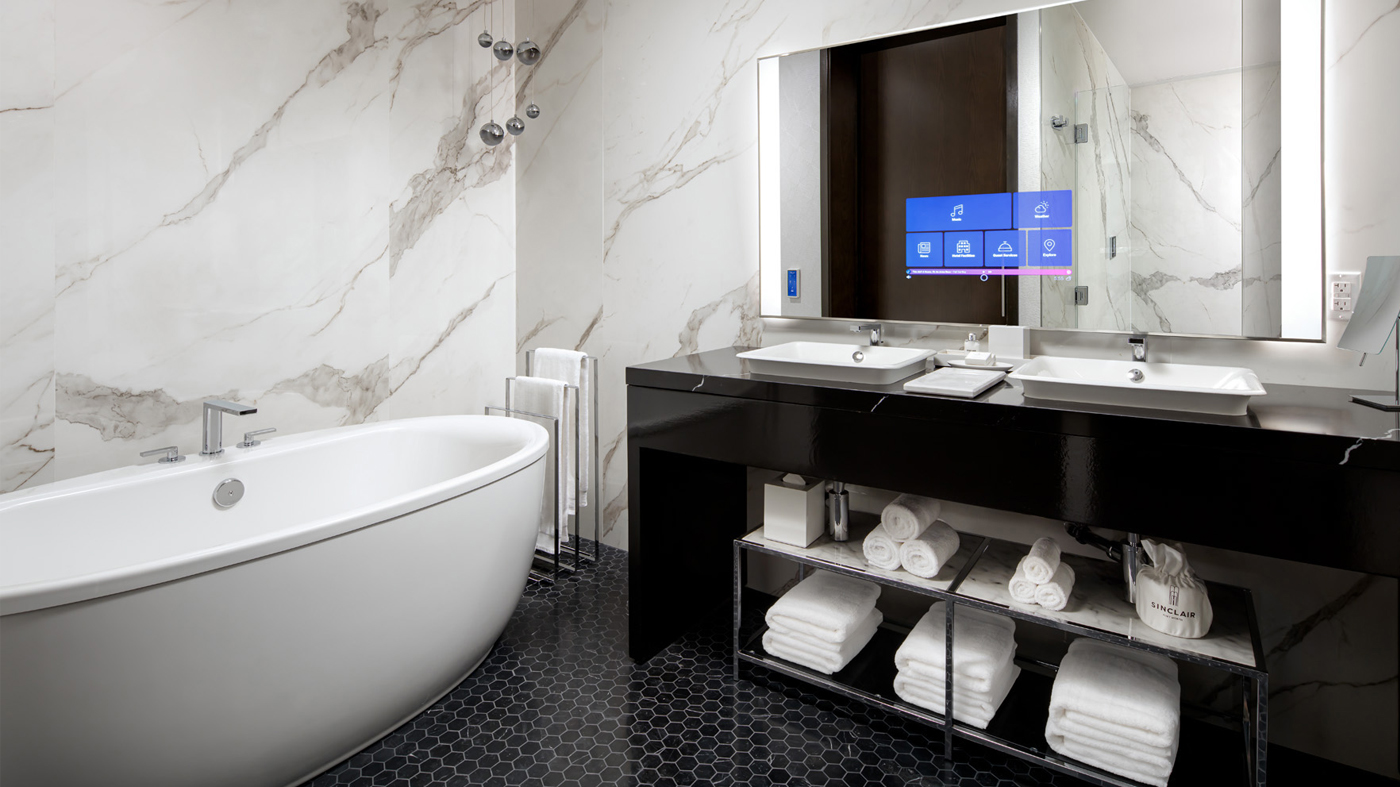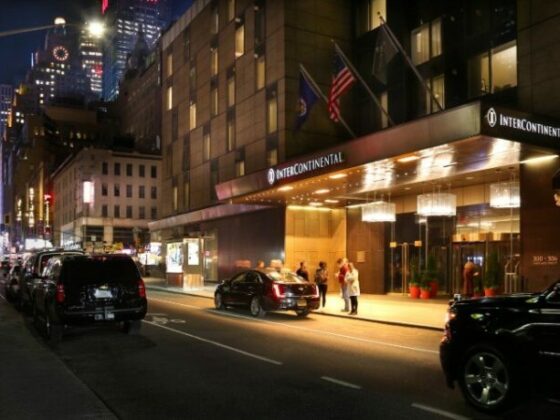
Powering hotels can be expensive. Energy accounts for 6 percent of all operating costs; on average, U.S. hotels spend $2,196 annually per available room on this line item, according to a report from the EPA’s ENERGY STAR program. For full-service hotels, reducing energy consumption by 10 percent is comparable to raising average daily rate by $1.35.
But energy efficiency brings benefits beyond boosting the bottom line. Developers are building and adapting the next generation of energy-efficient hotels with systems that require less maintenance, last longer, exchange data, and ease day-to-day operations for hotel teams and their guests.
To learn how hoteliers can take steps toward that vision, LODGING Back of House caught up with three individuals behind some of the country’s most energy-efficient hotels.
Getting Started
Farukh Aslam is a hotel developer and the CEO of Sinclair Digital Services Inc., a low-voltage design and consulting company developing digital DC-microgrid buildings. Sinclair Digital’s projects include the zero-emissions Hotel Marcel in New Haven, Connecticut, and the all-digital Sinclair Hotel in Fort Worth, Texas, both adaptive reuse projects. Whether building from the ground up or renovating, Aslam said the first thing hoteliers need to ask themselves is whether sustainability is important to them and their guests. Are they flipping a property or holding it? Those planning to keep a property in their portfolio for eight to 10 years are more likely to see significant payoffs for investing in energy-efficient technologies through monthly savings on utility costs and a higher resale value. Then there’s the question of guests and their values: Aslam pointed out that the new generation of travelers values sustainability and is committed to addressing climate change. “What are we doing as developers, and what are we doing as consumers? If we support projects that are less dependent on fossil fuels and are carbon neutral, I think you will see more and more people gravitate toward [those] hotels,” Aslam explained.
Ben Webster is the general manager for Hotel Marcel, which is part of Hilton’s Tapestry Collection. New Haven’s mid-century modern Brutalist office designed by Marcel Breuer is now an all-electric, solar-powered, LEED Platinum-certified hotel—the first in the country to operate free of fossil fuels and to achieve Passive House certification, an internationally recognized performance standard for air tightness and energy consumption. Webster said the property models what’s possible: a luxury hotel experience without carbon emissions and without compromising on quality. But it starts with a shared commitment from the owners, management, and property team to build and operate as environmentally responsible as possible, he said.
“We continually monitor our load
and find better ways to reduce base
load and shave our peak times.
As all systems are electric, it is easy
to see entire building usage in a snapshot but also track trends.”Ben Webster | Hotel Marcel
“Our owner, Bruce Becker, had many hurdles creating a 100 percent electric hotel but continued to find new solutions for all major facility systems, which can be easily replicated by other hotels,” Webster noted. “Similarly, the operating team continues to keep emission reduction at the forefront of all purchases and initiatives.” His advice is to invest in building systems that are 100 percent electric and as efficient as possible, and “then challenge the operations team to reduce every day.”
Brandon Lovan is director of engineering at The Ritz-Carlton, Portland, the luxury brand’s first property in the Pacific Northwest. The LEED Gold-certified, new-build hotel incorporates biophilic design, sustainability initiatives, energy efficiency, and water conservation into its building and operations. For hoteliers who aren’t in a position to update their building systems or who are feeling overwhelmed by this daunting task, Lovan shared his advice: Start small. Determine which operations are using the most energy and consider modifying those. “This can be as simple as replacing outdated lighting throughout a property with LED lighting,” Lovan explained. “As more and more seemingly small updates are made within a building, they become steps toward larger sustainable change for hotels.”
Smarter Systems
Aslam’s background in the telecom industry and as a hotel developer led him to explore using direct current (DC) technologies in building infrastructure—technology that’s already in use and has improved significantly in the past decade. “What’s important to me is I’m not using anything proprietary,” Aslam emphasized. “I’m a developer; I make decisions as an owner of a hotel when I bring on a new technology, a new vendor. I want to make sure there’s after-sale service and support.”
That’s why Aslam sees Power-over-Ethernet (PoE) as an easy choice; it’s already in use across hotels and offices, powering Wi-Fi access points, security cameras, and phone systems. “It exists in our infrastructure today,” he pointed out. “So, we have know-how: either in-house or a contract with an IT firm that manages these devices for us.”
Aslam’s company, Sinclair Digital, spearheaded this technology in the world’s first all-digital hotel: The Sinclair, part of Marriott’s Autograph Collection. A century-old Art Deco building in downtown Fort Worth is now a luxury hotel that uses PoE technology from Cisco Digital Building Switches to power 100 percent of the lighting. “This resulted in pretty substantial savings: 20 percent to 30 percent power consumption for the same light fixtures, on average,” he explained. Compared to traditional alternating current (AC) power, PoE technology eliminates the inefficiency of inverting AC into DC power, a process that creates energy waste in the form of heat. PoE technology can also power guest charging ports, motorized window shades, minibars, digital bathroom mirrors, and touchscreen shower controls. As guests plug in more devices, those savings add up, Aslam noted. And unlike AC power cables, PoE technology can transfer both power and data.
The Sinclair Hotel is also pioneering Class 4 fault-managed power systems (FMPS), which can deliver thousands of watts of power while intelligently mitigating the risk of shock or fire, according to the National Electrical Contractors Association. Aslam expects FMPS will revolutionize future buildings.
Streamlining Maintenance
Webster pointed out that Hotel Marcel’s energy-efficient features—including PoE lighting, heat-pump-based HVAC, and air-source heat pump domestic hot water systems—require less maintenance and offer more stability than traditional systems.
Similarly, at The Ritz-Carlton, Portland, Lovan said that energy-efficient systems help free up time for teams to keep the property running. “Much of what makes our energy-efficient materials and features so sustainable is their longevity and lifespan,” he said. “This in turn reduces many common maintenance issues that less energy-efficient hotels may have.” And by centralizing building systems, hoteliers can uncover even more opportunities to improve operational efficiencies. “Building automation systems not only help to reduce energy consumption through efficient control and scheduling but also allow the engineers to analyze the systems from one central location,” Lovan explained. “This increases their efficiency and allows them to spot issues before guests or staff even notice.”
Tracking Energy Trends
With access to data on energy usage, hoteliers can better understand where to target their efforts to reduce consumption. Webster noted that Hotel Marcel uses real-time reporting on the property’s electric load, solar production, and battery usage. “We continually monitor our load and find better ways to reduce base load and shave our peak times. As all systems are electric, it is easy to see entire building usage in a snapshot but also track trends,” he explained. “Because of our continuous efforts to improve the efficiency of operations, such as by replacing conventional electric laundry facility dryers with electric heat pump dryers, Hotel Marcel is now using 15 percent less energy than when the hotel opened in 2022.”
Aslam envisions a future where hotels display their real-time energy usage and sources in the lobby to educate guests and build loyalty—like the dashboard display in a Toyota Prius. And just as hybrid and electric cars have come a long way since their inception, Aslam expects energy-efficient building systems to improve with further use. “We continue to learn, we continue to make it more efficient, easier to install, easier to deploy. The more we do it, the more we learn.”
BEST PRACTICE
Reducing the ‘urban heat island effect’
Urban areas without a little green space can turn into heat islands. Roads and buildings absorb more of the sun’s heat, leading to daytime temperatures up to 7 degrees higher than those in outlying areas, according to the EPA.
Hoteliers can reduce this effect by greening their design, explained Brandon Lovan, director of engineering at The Ritz-Carlton, Portland. The hotel’s eco-roof includes adaptive plant species with low water requirements that capture and store rainwater within the roof soil, supporting water conservation efforts and improving energy efficiency. But it’s not just the hotel that benefits: “The innovative eco-roof reduces the urban heat island effect by allowing heat to escape through its greenery instead of being trapped within a hardscape,” Lovan described. “As a result, Portland has more green space.” CK






